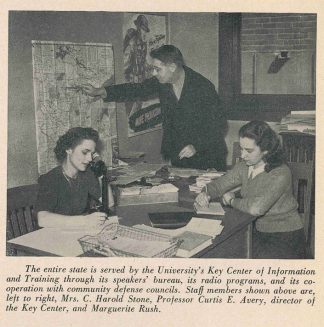Wednesday marks 75 years since the attack on Pearl Harbor in Hawaii which led to a declaration of war by the United States against Japan, Germany, and Italy and the country’s official entry into World War II.
These events are familiar to anyone who has had a class on United States History, but today our podcast focuses on the events on the homefront following the Battle of Pearl Harbor. Specifically we will listen in on a discussion from 1946 on the discriminatory removal and, then, resettlement of persons of Japanese ancestry with Frank M. Rarig, Lauren Stiefel, and Reverend Daisuke Kitagawa. You can listen to the episode in the browser here and read the script below.
Podcast (umnradio): Play in new window | Download
Episode 4: Pearl Harbor and Japanese Americans
You are listening to U of M Radio on Your Historic Dial podcast and this is episode 4: Pearl Harbor and Japanese Americans
Hello! Karen here at the University of Minnesota Archives. In recognition of Pearl Harbor Remembrance Day on December 7th and the 75th anniversary of the U.S. entering WWII, I chose an episode from the program The World We Want. This program ran from January of 1943 through at least July of 1946. The program was sponsored by the Key Center of War Information and the University of Minnesota’s Department of Speech, broadcast weekly over the radio station WLB, the previous call letters of KUOM.

Key Center of War Information staff. The Minnesota Alumni Weekly: Special War Activities Issue, May 2, 1942. University Archives.
Our episode today is from Special Bulletin No. 145 : Post-War Resettlement of Persons of Japanese Ancestry which aired February of 1946, five months after World War II was declared over. The show begins with a description of the events following the bombing of Pearl Harbor by Frank Rarig, professor of Speech at the University of Minnesota.
Guests for this discussion included Lauren Stiefel of the Minneapolis College Women’s Club, and Reverend Daisuke Kitagawa, or “Dai,” director of the United Ministry of Japanese Americans in the Twin Cities area. Rarig asks Stiefel to describe the political and personal interest behind the forced removal efforts,which included economic competition and general resentment. Skipping ahead a bit in the episode, the three of them talk about how this action, this incarceration of a large population that included many legal residents and American citizens, was not similarly applied to other Axis power ancestries such as the Germans and Italians living in the United States. Close to 70% of the persons of Japanese ancestry forcibly removed were American citizens.*
Next, we’ll hear about the mixed interest and disapproval of military service provided by Japanese Americans, by their community and others. As well as how secrecy in military interest for certain dangerous missions done by Japanese Americans did not allow for recognition of their participation in the war effort.
This discussion makes it fairly clear how tense the atmosphere truly was. Kitagawa discusses how much pressure there was in not just the incarceration or military service, but in simply staying or leaving the United States. During the war many Japanese Americans had been deported or coerced to give up dual citizenship by family pressures to remain loyal to Japan or simply to avoid military service.The War Relocation Authority camps had been ordered to be closed in January of 1945, but closed fairly slowly as the resettlement of Japanese Americans included just as must discrimination as the earlier forced removal.
It is hard to imagine the number of families that faced the difficulties of re-assimilating and finding work. However, Kitagawa, Stiefel and Rarig sound like they, at least, had hope in the younger generation of Japanese Americans’ ability to rebuild.
The show ends with a question of responsibilities moving forward. Airing just over a year after the War Relocation Authority camps were ordered to close and almost three years after Japanese had been legally allowed to leave, although not well supported to do so, Rarig, Stiefel and Kitagawa recognized how hard the coming years would still be and they called on the support of all of their fellow Americans.
That’s all I have for this episode. Next time we’ll look ahead to the 1980s. Thanks for tuning in!
The U of M Radio on Your Historic Dial Podcast is produced every other week for your enjoyment. Subscribe or download on iTunes so you don’t miss another moment of historic Minnesota radio.
If you enjoy our clips and want to hear or learn more, go to www.lib.umn.edu/uarchives and search KUOM in the collections guides.
Digitization of University Archives recordings was financed in part with funds provided by the State of Minnesota from the Arts and Cultural Heritage Fund through the Minnesota Historical Society.
Learn more
For further information, preferred terminology, and oral histories related to the incarceration of Japanese Americans, please see Densho: The Japanese American Legacy Project and the Japanese American Citizens League’s Power of Words Handbook mentioned in this podcast.
*National Japanese American Citizens League Power of Words II Committee. Power of Words Handbook, A Guide to Language about Japanese Americans in World War II: Understanding Euphemisms and Preferred Terminology, April 27, 2013.
—Karen Obermeyer-Kolb is a project archivist for the University of Minnesota Archives. Learn more about the University of Minnesota Archives.




